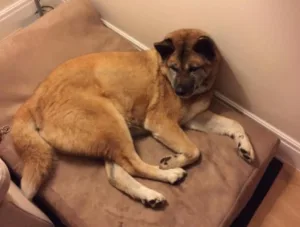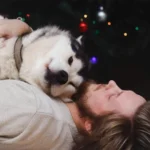Restlessness around nighttime is a typical issue for canines, and it’s something beyond a burden for pet owners. A decent night’s rest is pivotal for a canine’s general wellbeing and prosperity, just as it is for us. At the point when their rest is disturbed, it can affect their energy levels, mindset, and, surprisingly, their immune system.
At the point when sleep is disturbed, their bodies won’t be able to appropriately re-energize. This can prompt issues like a weakened immune system, behavior changes, and even weight gain. As pet owners, restless dog nights especially puppy first night can be disappointing and irritating. We believe our canine sidekicks should be happy and healthy, and consistent interruptions around nighttime can make that troublesome.
There are many reasons why a dog may not sleep well at night.
- Physical discomfort: Health problems such as arthritis, gastrointestinal problems, or injuries can cause discomfort in dogs. They may also be too hot or too cold, or be disturbed by external factors such as fleas or ticks.
- Anxiety or stress: Dogs can experience anxiety or stress for a variety of reasons, such as a change in routine, loud noises (such as fireworks or thunder), being left alone, or the presence of new people or animals in the home.
- Lack of exercise or mental stimulation: Dogs need regular physical exercise and mental stimulation to stay healthy and sleep well. Without enough activity during the day, they may have extra energy at night.
- Aging: Older dogs may have difficulty sleeping due to age-related conditions such as cognitive impairment syndrome, which can disrupt their sleep-wake cycle.
- Behavioral problems: Some dogs may develop bad habits or behavioral problems that disrupt their sleep, such as excessive barking, grinding, or separation anxiety.
It is important to notice your canine’s way of behaving and counsel a veterinarian on the off chance that you are worried about their sleeping patterns. They can help identify any fundamental medical issues and give direction on the best way to further develop your canine’s sleep quality.
Section 1: Understanding Nighttime Restlessness
No doubt! Dogs, like humans, sometimes struggle to get a restful night’s sleep for a variety of reasons.
- Disturbance: Loud noises, like firecrackers or thunder, can surprise canines and upset their rest. Indeed, even regular sounds, like traffic or neighbors, can irritate highly sensitive dogs.
- Discomfort or pain: Physical discomfort from conditions, for example, arthritis or injury, can make it challenging for dog sleeping on bed. This pain may worsen at night when they are trying to rest.
- Anxiety: Dogs can experience anxiety for a variety of reasons, including separation anxiety, fear of loud noises, or changes in their environment. This anxiety may manifest as restlessness, pacing, or excessive vocalization, making it difficult for them to sit and sleep.
- Behavioral problems: Certain behavioral problems, such as compulsive licking or chewing, can disrupt a dog’s sleep patterns. Additionally, highly predatory dogs can become restless at night if they detect small animals or other stimuli outside.
- Aging: As dogs get older, they may experience changes in their sleep patterns. Older dogs may need to go outside to urinate more frequently or may suffer from cognitive decline, which can cause confusion or disorientation at night.
- Medical issues: Medical issues that affect a dog’s capacity to get a good night’s sleep include sleep incorporate and canine mental impairment, which is practically identical to dementia in humans. Snoring, breathing difficulties, or tossing and turning at night are a portion of the side effects that these issues could create.
Physical health:
- Like humans, canines need plenty of sleep to maintain a healthy immune system. Chronic sleep deprivation can weaken their immune response, making them more vulnerable to disease and infection.
- Lack of sleep affects hormonal balance, including those involved in guiding desire. It can prompt weight gain or corpulence in canines.
- Sleep is essential for muscle repair and development. Without sufficient rest, dogs may experience slower recovery times after physical activity or injuries.
- Chronic lack of sleep can increase a dog’s feelings of anxiety and circulatory strain, increasing the risk of heart disease and other cardiovascular diseases.
Behavior:
- Sleep-deprived dogs are more prone to irritability and mood swings. They can easily become agitated or attack people or other animals.
- Dogs that don’t get enough sleep may exhibit hyperactive behavior, including excessive barking, pacing, or restlessness.
- Sleep deprivation affects cognitive function in dogs, causing difficulties in learning, problem solving, and memory retention.
- Chronic sleep deprivation can increase aggressive tendencies in dogs, leading to conflicts with other pets or even their owners.
Emotional well-being:
- Lack of sleep can increase a dog’s overall anxiety level, making him prone to stress-related behaviors such as excessive grooming, panting, or shaking.
- Dogs deprived of adequate sleep can show signs of depression, including lethargy, a loss of interest in activities, and a loss of appetite.
- Dogs rely on quality sleep to process social interactions and strengthen bonds with their owners and other animals. Lack of sleep can hinder these processes, affecting their ability to form healthy relationships.
Increased stress and decreased quality of life:
- Lack of sleep raises stress hormone levels in dogs, which leads to chronic stress. This can have long-term detrimental effects on their physical and mental health.
- The cumulative effects of sleep deprivation on a dog’s physical health, behavior, and emotional well-being can ultimately shorten their lifespan and reduce their overall quality of life.
Section 2: Identifying the Root Causes
- Environmental factors such as noise, smells, uncomfortable bedding, and temperature fluctuations can actually disrupt a dog’s sleep. Dogs have sensitive senses, so things like loud noises, strong smells, or uncomfortable sleeping conditions can affect their ability to rest peacefully. Providing a calm, relaxing sleep environment can help alleviate these concerns.
- Physical and medical conditions can also play a part in a canine’s capacity to rest soundly. Chronic pain, joint issues, and age-related discomfort can make it challenging for dogs to find a comfortable sleeping position and stay asleep through the night. It is important to monitor your dog for any signs of discomfort or pain and counsel a veterinarian if you suspect any underlying medical issues.
- Behavioral and psychological factors can also contribute to nighttime restlessness in dogs. Anxiety, stress, separation anxiety, and other behavioral problems might appear as evening pacing, crying, or other problematic ways of behaving. Resolving these issues through behavior modification techniques, training, and providing a protected and comfortable environment can help reduce nighttime anxiety.
Section 3: Solutions and Strategies
Creating a Comfortable Sleep Environment:
- Choosing the right bed: Consider your dog’s size, age, and sleeping habits when choosing a bed. Some dogs prefer bolster beds for support, while others may like memory foam or orthopedic beds for joint comfort. Make sure the bed is big enough for your dog to stretch out comfortably.
- Minimize Disturbance: Spot your canine’s dog bed in a calm, low-traffic region of your home where they will not be upset by family exercises. Create a comfortable cave-like space by utilizing covers or drapes to create a feeling of safety.
- Controlling Room temperature:Dogs are sensitive to temperature extremes, so keep the room comfortably cool in summer and warm in winter.
Promoting Relaxation and Calmness:
- Exercise: A tired dog is a sleepy dog! Engage your dog in daily physical activity to tire him out before bed.
- Mental stimulation: Interactive toys and puzzle feeders challenge their brains and promote relaxation.
- Calming aid: Consider chewing a calming herb with ingredients like chamomile or lavender or using a white noise machine to mask disturbing sounds.
- soothing techniques: A gentle massage before bed can help your dog relax.
Behavioral Modifications:
- Establish a routine: Create a consistent bedtime schedule with potty breaks, quiet playtime, and cuddle time when it’s time to wind down.
- Address separation anxiety: Crate training can provide a safe place if your dog cries when left alone. Gradually increase crate time to build up comfort.
- Ignore unwanted behavior. Ignore barking or crying at night. This can reinforce the behavior.
Medical intervention:
- See your vet: If sleep problems persist, consult your veterinarian. Underlying medical conditions such as pain, anxiety disorders, or hormonal imbalances may be the culprit.
Section 4: Supporting Your Dog’s Sleep Journey
- Establishing a Bedtime Routine:Canines flourish with consistency. A steady sleep-time routine signals to their inner clock that now is the ideal time to wind down. This incorporates steady taking care of times, strolling timetables, and recess, all leading up to a set sleep time. After some time, this standard will turn into a prompt for rest.
- Monitoring and Adjusting:Pay attention to your dog’s sleep patterns and behaviors. Are they restless at night? Cry or bark? These may be signs that something is disturbing their sleep. After identifying potential problems, you can begin making adjustments to the routine to address them.
- Patience and Persistence:Working on instilled habits takes time. Be patient and reliable with your new sleep schedule. There might be a few bumps along the way, yet with continued exertion, you’ll help your canine develop healthy sleep habits on their dog beds.
Conclusion:
The article highlights the importance of monitoring nighttime restlessness in dogs. He examined how factors such as anxiety, medical conditions, and a lack of routine can disrupt a canine’s sleep, affecting their general health and well-being. By implementing techniques such as setting a reliable daily routine, providing plenty of activity, and establishing a calm bedtime environment, pet owners can fundamentally improve their canine’s quality of rest. . Keep in mind that a more refreshed canine is a happier and better canine. If your dog’s nighttime restlessness continues, feel free to seek proficient direction from your veterinarian to guarantee your shaggy companion gets the relaxing rest he merits.
FAQs:
Why is my dog suddenly not sleeping at night?
It could be a physical problem like pain or needing to use the bathroom. Alternatively, your pup may experience anxiety or stress due to routine changes, loud noises, or even separation anxiety.
How do I get my dog to stay asleep at night?
Walk or playtime Alternatively, take him outside and throw a ball for 15 minutes before bed. Establish a relaxing bedtime routine with a potty break and some quiet time with a chew toy.
What do you do if your dog won’t go to sleep?
Nighttime is usually boring for your dog. Dim the lights, keep things quiet, and offer a comfortable bed in a quiet place. If they seem restless, consider relaxing background music, such as a quiet chew toy or classical music.
How can I help my restless dog at night?
There are a few things you can try to help your restless dog at night.
Establish a comfortable bedtime routine,
A quiet walk and some quiet playtime.
Creating a safe and comfortable space
What can I give my dog for sleep?
To help establish healthy sleep patterns, melatonin is recommended as part of a bedtime routine. A sleep routine is equally important. Keeping a consistent bedtime, providing a comfortable sleeping space, and making sure your dog gets enough exercise during the day.













